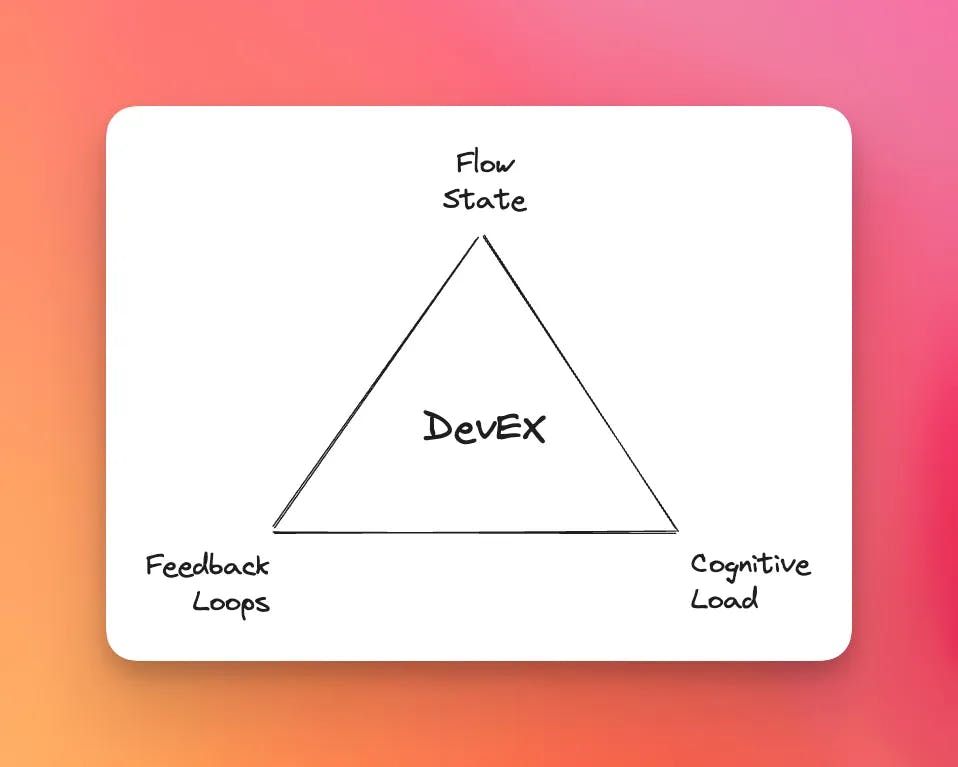
Introduction
The landscape of software development is constantly changing and evolving, with one term gaining increasing attention lately - Developer Experience or DevEx. It is a comprehensive term encompassing the multitude of experiences developers face in their daily tasks. This post aims to explore DevEx, its key dimensions, how to measure it, ways to improve it, and finally, a few real-world examples for a more concrete understanding.
What is DevEx?
Short for Developer Experience, DevEx is an overarching term that encapsulates the environment and the corresponding experiences a developer has while building and maintaining software. It is essentially the User Experience (UX) with developers as the primary users. A good DevEx is marked by an efficient, frictionless, and intuitive environment that promotes swift coding, effective problem-solving, and overall, a satisfied and productive developer.
The 3 core dimensions of developer experience
1. Feedback Loops
The feedback loop dimension of DevEx refers to the process by which developers receive responses to their actions or decisions. Rapid and valuable feedback is crucial in coding as it enables developers to realize and rectify their errors swiftly, make quicker iterations, and ultimately improve their productivity and code quality. Shorter, more effective feedback loops lead to better DevEx.
2. Cognitive Load
Cognitive Load in DevEx refers to the mental effort required by a developer to accomplish a task or utilize a tool. A great DevEx strives to minimize this cognitive load. By simplifying interfaces, optimizing processes, and enhancing the intuitiveness of tools, developers can focus their mental energy on problem-solving and innovation rather than struggling with complex tools or convoluted processes.
3. Flow State
The flow state represents a dimension of DevEx wherein a developer becomes fully immersed in a task, experiencing a heightened sense of focus and a reduction in the perception of time. A positive DevEx fosters this flow state, reducing interruptions and streamlining workflows to keep developers "in the zone," thereby improving their productivity and job satisfaction.
Measuring DevEx
Measuring DevEx can be challenging, but it's vital to quantify the success of your initiatives and pinpoint areas for improvement. Here are some of the ways you can measure DevEx:
- Defining Core Dimensions: Identify specific topics within each of the three core dimensions of developer experience - feedback loops, cognitive load, and flow state.
- Capturing Perceptual and Workflow Metrics: Capture both perceptual and workflow metrics for each topic. Neither of these measures alone can fully capture the developer experience.
- Perceptual measures capture the developers' attitudes, feelings, and opinions about their work and the processes they use.
- Workflow measures involve capturing objective data about the engineering systems and processes that the developers use.
- Using Key Performance Indicators (KPIs): Use KPIs to align with higher-level business outcomes and drive the desired results.
- Starting with Surveys: Begin the measurement process with surveys, which can capture KPIs, perceptual measures, and workflow measures effectively.
- Survey Design: Be careful with survey design and implementation to avoid inaccurate and unreliable results. Survey questions should be based on well-defined constructs and rigorously tested.
- Breaking Down Surveys: Break down survey results by team and persona for a more detailed understanding of developer experience.
- Benchmark Comparison: Compare the results against benchmarks for a more contextual understanding and to help drive action.
- Transactional Surveys: Utilize transactional surveys to collect feedback at specific touchpoints.
- Avoiding Survey Fatigue: Keep survey participation rates high by ensuring that follow-up action is taken based on survey results, so developers feel that their feedback is valuable and is being used to drive improvements.
How to Improve DevEx
Improving DevEx involves creating a developer-centric culture and implementing effective tools and practices. Some ways to improve DevEx include:
- Promote the Use of Efficient Tools: Implementing efficient, user-friendly tools that simplify the development process can drastically improve the developer experience. Developers should be provided with the resources and technologies they need to streamline their workflow and increase their productivity.
- Ensure Quality Documentation: High-quality, up-to-date documentation is crucial for developers to understand the systems they are working with. Providing comprehensive and easy-to-understand documentation reduces cognitive load and helps developers to solve problems independently.
- Improve Onboarding Processes: Clear, comprehensive onboarding procedures are essential for new hires to quickly acclimate to their roles and responsibilities. A thorough onboarding process can reduce ramp-up time and increase a developer's engagement and productivity from the get-go.
- Shorten Developer Feedback Loops: Fast feedback loops increase the velocity of development without sacrificing quality. Tools for code profiling, tracing, and continuous integration and deployment can help here.
- Promote Collaboration and Understanding: Regular team meetings, presentations, and internal conferences can foster an understanding of individual roles, team goals, and the wider business objectives.
Conclusion
A focus on Developer Experience doesn't merely benefit developers, it positively impacts the entire organization. Better DevEx can lead to improved code quality, enhanced team coordination, reduced developer fatigue, and lower rates of developer churn. By investing in DevEx, businesses can foster a more efficient, productive, and motivated development team, leading to significant growth for the organization.
Thanks for reading! Subscribe for free to receive new posts and support my work.